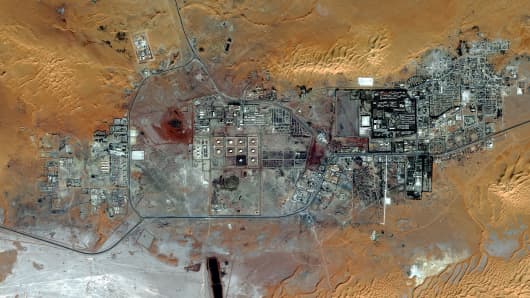'No Known Threats'
CNBC could not determine whether Exclusive Analysis had provided their findings to BP, Statoil or Sonatrach because the firm kept its client list confidential. As such, it was not clear whether the joint operators of the In Amenas plant or the Algerian government had seen the threat assessments.
Security analysts and former serving officers in the Israeli and British military contacted by CNBC said that in practice -- even with forewarnings -- it was extremely difficult to pre-empt and neutralize terror threats.
"Weeks before September 11 the U.S. intelligence warned against plane hijacking but the White House couldn't address the threat appropriately because it wasn't specific enough," said Dr. Gal Luft, a senior adviser to the United States Energy Security Council and a former lieutenant colonel in the Israel Defense Forces.
(Read More: As Security Costs Rise, Oil Firms Stay Put in Algeria)
"Issuing a warning is easy; acting on them is a whole different matter," Luft added. "My main takeaway from the episode is the importance of better coordination between private and public sectors in such energy compounds. Our experience shows that many of the attacks are aided by insiders who are not sufficiently vetted."
Colonel Richard Kemp, who commanded British Forces in Afghanistan in 2003 and headed the counter terrorism team at the U.K. Joint Intelligence Committee in the Cabinet Office between 2002 and 2006, said assessments such as the ones issued by Exclusive Analysis and other security firms "however often repeated, may not necessarily lead one to prevent an attack."
He explained: "It is common to analyze the intent and capability of various groups/networks and the vulnerability/attractiveness of target sets without specific intelligence on a group/networks plans. This might well suggest a range of potential threats but is not necessarily enough -- when balanced against other threats and resource priorities -- to decide on specific security measures."
Repeat attacks against energy facilities in Algeria, Libya or Niger "are indeed possible," Colonel Kemp added, "although I would imagine that additional security measures will be in place, especially in Algeria, which might deter/prevent attacks in the short to medium term."
Algeria's foreign minister acknowledged on Friday that security forces made mistakes in the hostage crisis in which dozens of foreign workers were killed during Algerian military strikes, the Associated Press reported.
"We are in the process of assessing our mistakes," Mourad Medelci told The Associated Press in an interview at the World Economic Forum in Davos, Switzerland.
Still, the warnings could be seen as damaging, and may spark accusations that the Algerian government, and possibly the joint-venture operators of the plant – Sonatrach, Statoil and BP – didn't act fast enough and respond to incipient security threats.
When asked to comment about the findings, BP spokesman Robert Wine told CNBC that "there were no known specific threats to the site." And in the immediate run up to the incident "we do not believe that the In Amenas JV asked for additional security."
In the immediate aftermath of the assault on In Amenas, many security experts were shocked that the attackers could have breached what many have described as a 'ring of steel' and seized a facility that resembles a fortified military stronghold more than a natural gas processing plant.
"As with oil and gas installations in many other countries it is the host Government that is responsible for providing security," BP said.
(Read more: Dow Chemical CEO: Energy Growth a 'Game Changer')
The Algerian government "provides several layers" of security around the In Amenas site, the oil company explained. "Large numbers of Algerian security forces are stationed in the vicinity of In Amenas, with resources including attack helicopters and a unit of T72 tanks."
The firm said it also requires the assessment of security risk and the development of a security management plan for every business entity.
"For the Algeria business this is reviewed at least annually. This includes an assessment of the terrorist threat to all assets, including In Amenas," according to BP.
Additionally, access to the vicinity of the site is controlled by the Algerian gendarmerie, with checkpoints. The In Amenas JV also uses unarmed contractors to provide liaison to the military and security forces. The facility "has operated safely under this arrangement for many years," BP said.
Simon Sole, the founder of Exclusive Analysis and its CEO, said Al-Qaeda in the Islamic Maghreb (AQIM) is "extremely mobile" making it very hard for governments to respond and pinpoint an attack.
"I cannot believe that this is the last attack," Sole said. From AQIM's perspective, "it's been a very effective attack – they've achieved global notoriety."
Statoil officials have yet to respond to an emailed request from CNBC seeking clarification over the security provisions at the plant.
The U.K. Daily Telegraph reported on Sunday that the Algerian gas plant where 37 foreign hostages were killed last weekend had employed a trucking company owned by the brother of the regional leader of al-Qaeda, raising suggestions that it was inside information that helped the attackers penetrate security.
NYSE-listed global information and analytics provider IHS acquired Exclusive Analysis on December 12.





